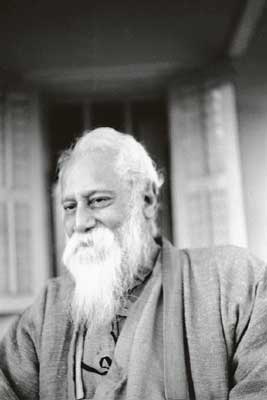'Patriotism cannot be our final shelter'
Professor Tan Sri Dato' Dzulkifli Abd Razak
Comment
New Sunday Times - 22-05-2011
THIS year marks the 150th anniversary of the birth of iconic poet and playwright Rabindranath Tagore (May 7, 1861-Aug 7, 1941), Asia's first recipient of the Nobel Prize for Literature in 1913. In the later years of his life, at the age of 70, he took up painting -- his works are regarded as a part of India's contemporary art. Rabindranath was also a well-known and popular author in the West. In 1915, he received a knighthood. However, he had no qualms repudiating it in 1919 in light of the British massacre of some 400 Indians in Amritsar, Punjab.

Born in Kolkata into a wealthy and prominent family, Rabindranath took after his father as a reformer and scholar. He reportedly started to compose poems at the age of eight, and published his first book -- a collection of poems -- when he was 17. In fact, the national anthems of both Bangladesh and India were penned by him.
Later, he travelled to more than 30 countries covering five continents between 1878 and 1932. He went far and wide to places of diverse sociocultural mix that further helped him to form opinions about the world around him. At the same time, it presented an opportunity for him to familiarise others with his works and ideas that later formed part of his legacy. This included some of his lecturing engagements to advocate his philosophy and sociopolitical beliefs.
He interacted with many world leaders from different ideologies and practices. Rabindranath was truly an internationalist when he stressed the need for a new world order based on transnational values and ideas, the "unity consciousness".
On 14 July 1927, Rabindranath and two companions began a four-month tour of Indonesia (Bali and Java), Thailand, Singapore and Malaya (Kuala Lumpur, Malacca and Penang). His travelogues were collected into the work, Jatri.
In Penang, he was received at Butterworth train station by notable local personalities and was given a rousing welcome by the local and expatriate communities. This was well recorded in the Straits Echo at the time. He gave a number of speeches and lectures about his philosophy, especially with regard to internationalism, at Empire Theatre, purportedly located on Magazine Road.
On May 14 this year, Rabindranath's grandnephew, Dr Saranindranath Tagore, spoke on Rabindranath Tagore and the Cosmopolitan Vision as part of the Penang Story Lecture Series, which aims to explore the island as a centre for knowledge development and intellectual movement. It is also intended to position Penang internationally in global history. In this case, it is about recreating some aspects of Rabindranath's visit, particularly his ideas of universal values, cultural identity and the importance of education.
To Saranindranath, his granduncle's idea of education is to arrive at the "consciousness of oneness" or "unity consciousness" by seeking harmony rather than uniformity, moving from particular to universal, and emotion to reason. It is about respecting difference, rather than subverting it which seems to be the failure of post-modern education. This is reflected in the present crisis of civilisations, as the East and the West become increasingly polarised and there is the latter's tendency to reject "multiculturalism", especially in old Europe.
Rabindranath advocated "cosmopolitan education" which is universalising and non-hegemonic; a meeting place to reduce ethnocentric ideas and pluralism. It is about the formation of attitude (education, perhaps?) to appreciate multiple and competing universalisms rather than the clash of civilisations.
Rabindranath's vision was very much ahead of his time which remains remarkably relevant today, particularly for a multicultural and multi-ethnic society such as Malaysia where the schooling system is still fragmented and remotely unifying, rendering the "consciousness of oneness" that more difficult.
Rabindranath said: "The highest education is that which does not merely give us information but makes our life in harmony with all existence." It is this inherent rationality that makes his universalism so appealing even as we struggle to make it a reality.
He once wrote: "Patriotism cannot be our final shelter. My refuge is humanity."
* The writer is the Vice-Chancellor of Universiti Sains Malaysia. He can be contacted at vc@usm.my
